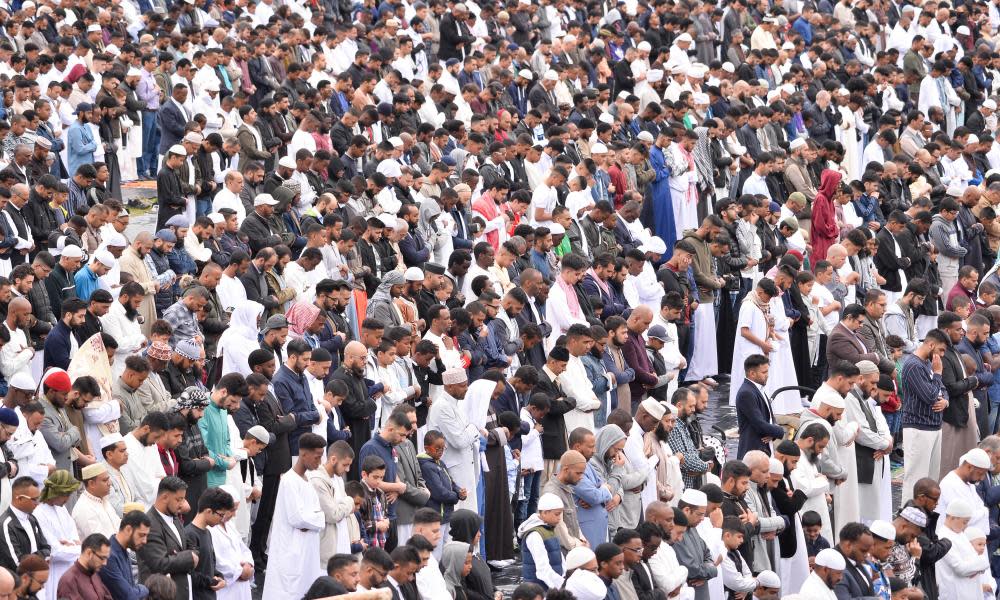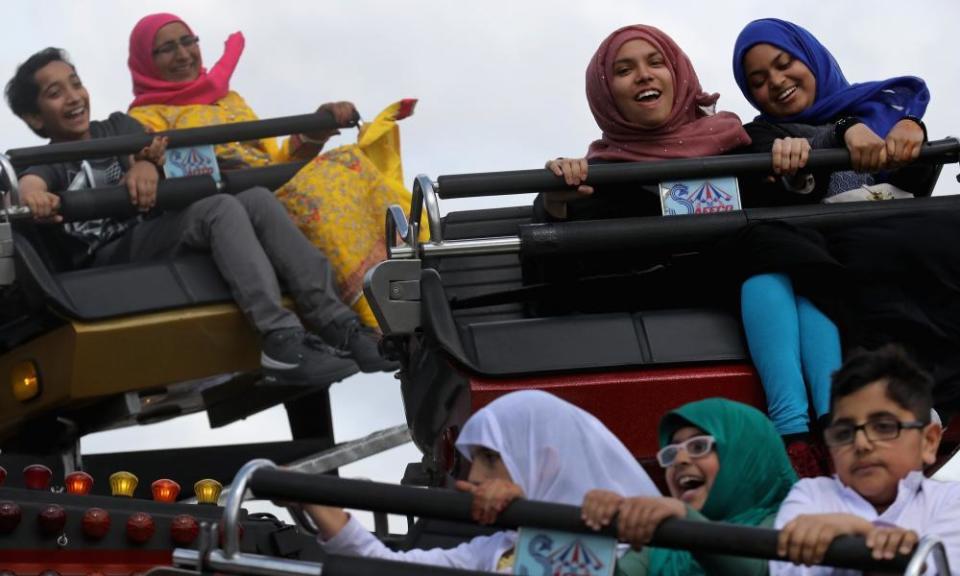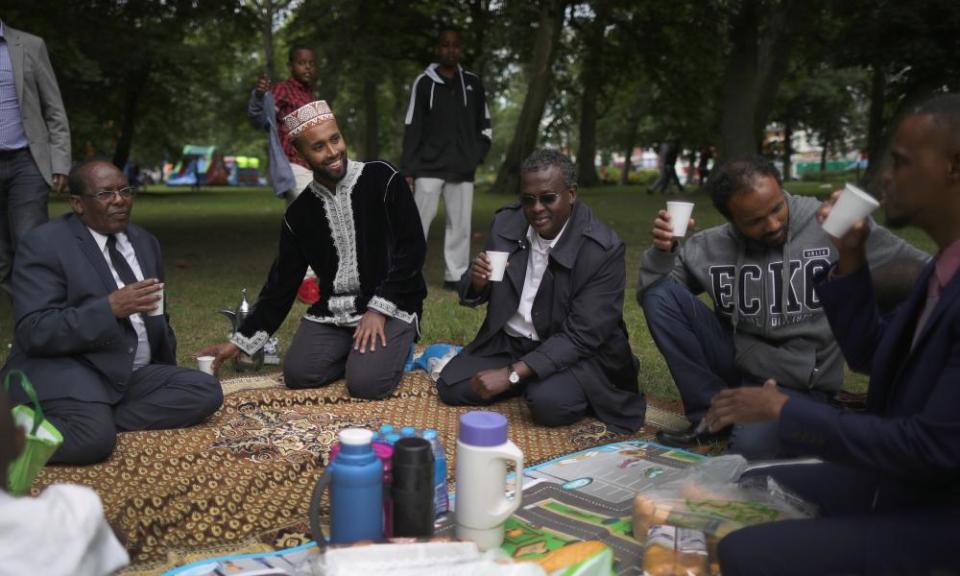Muslims in Birmingham celebrate Eid al-Fitr amid increased security

More than 100,000 people bowed in prayer in Birmingham’s Small Heath park at the start of Eid al-Fitr on Sunday amid heightened security, with armed police present for the first time in the seven-year history of the Celebrate Eid festival.
Row upon row of men touched their foreheads to the ground, with small boys following the actions of their fathers and grandfathers. Those in wheelchairs and on crutches, the old and the infirm, bent down as far they could to follow the prayer rituals.
Women prayed in a separate section, often in extended family groups. Some wore niqabs, most wore hijabs, many had hennaed hands and wore their finest clothes. Even babies in strollers were dressed to impress.
Celebrate Eid, Europe’s biggest festival to mark the end of the holy month of Ramadan, is hosted by the UK’s most Muslim city. Once the mass prayer was over, families turned their attention to other activities on offer: fairground rides, clay pigeon shooting, miniature golf and rodeo bull riding.
Amer Ijaz, general manager of the Green Lane Masjid and Community Centre, which organised the event with five other mosques and the Muslim charity Human Appeal, had been at the park, round the clock, since Wednesday.
“I‘ve been planning this since November, and I haven’t slept for the past four days. If anything goes wrong, it’s all on my head,” Ijaz said. “I feel quite emotional now it’s here. A lot of members of the community are coming up to hug me. It’s buzzing – really vibrant.”

The carnival atmosphere in the park was a welcome relief from the anxiety felt by many Muslims in recent weeks as Britain has been hit by a string of terrorist attacks.
Despite the speed and vigour with which Muslim leaders have condemned extremist acts, the number of Islamophobic attacks increased fivefold in the aftermath of the suicide bombing at the Manchester Arena, and there was a spike in anti-Muslim hate crime in the capital following the ramming by a vehicle and stabbings at London Bridge.
Women have been particularly vulnerable to abuse, with some saying they have been anxious about using public transport following the attacks. Some schools with large proportions of Muslim pupils have cancelled outings.
Last Monday, a man driving a rented van ploughed into a crowd outside the Muslim Welfare House, in Finsbury Park, London, leaving one man dead and at least 10 people injured. Darren Osborne has since been charged with terrorism-related murder and attempted murder.
“It’s been a difficult few weeks. Everyone feels anxious, whatever community you’re from,” said Sunny Araf, head of security for Celebrate Eid. “This year, as a precautionary measure, we’ve increased security to give people the confidence that this is a safe place.”
The West Midlands police stationed armed officers at the entrance to the park, and had a highly visible presence inside the festival. The organisers of the event provided additional security personnel, stewards and a “response team” to handle specific incidents.

But the biggest headache was expected to be reuniting lost children with their parents. Last year, about 1,000 youngsters became separated from their families. This year the figure was expected to rise in line with the 20% increase in the number of visitors to 106,000.
By 9.30am, Aida Diriye, 36, had already been separated from members of her extended family although she was preparing to pray with her 11-month-old baby, her mother and a handful of cousins. “Of course we feel vulnerable at the moment but our faith makes us strong. We have to be more alert and protect one another, and also show people we’re united. We will not let all this negativity and hatred destroy what’s good in life,” she said.
She had been verbally abused while driving recently by a couple in another car. “They used the N-word, and said ‘dirty Muslim’. I laughed it off. People like that are uneducated.”
Before the prayer, Zaker Choudhry, a local Lib Dem councillor, told the crowd: “This is the true face of Islam. We are sending a message to the whole world that we are united against terrorism, united against hate.”
John Clancy, leader of Birmingham city council, said the event was a “great, glorious gathering – a high point for this city”. A quarter of Birmingham’s 1.1 million population was Muslim, he added. “You are a crucial part of this city’s DNA. Brummie Muslims built Birmingham.”
Sarah Boycott, assistant chief constable of West Midlands police, urged people to report anti-Muslim abuse and attacks. “Some people in our community are not tolerant. Please tell us about it,” she said.
The charity Human Appeal said it expected to have raised £10m in charitable donations during Ramadan. This year, for the first time, it was raising money for projects to counter poverty, domestic violence and homelessness in the UK, although most funds would be spent abroad. It had launched an appeal for those affected by the Grenfell Tower fire, in west London, and by other recent terror attacks.
Ijaz said the Green Lane mosque had received calls from members of the community frightened by recent attacks. “What has happened has shaken the core of the nation, and the focus is on us as Muslims. Now is the time for us to step up to the plate and shine as a community. We’re going to come through this.”

 Yahoo News
Yahoo News 
